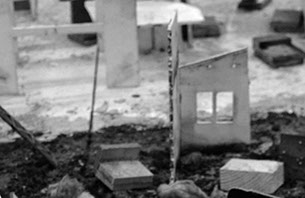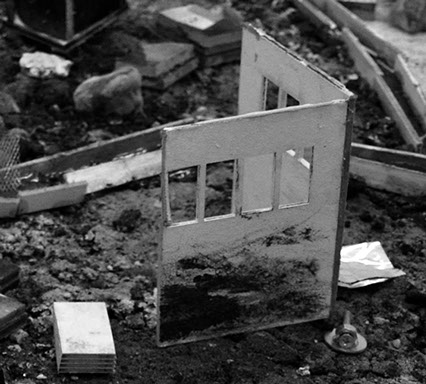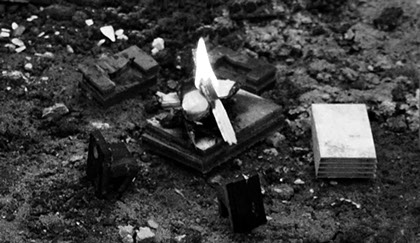The Post Mall
In the post mall pieces of everyone would be gathering.
It is a place of common use.
Is a place of peace, a place for thinking.
Other times it is a place of debate and discussions.
In the post mall people who are not thinking alike are meeting.
The Post mall is a place of disagreements.
A place of arguments.
The materiality of the post mall is dynamic.
Pieces would come and go,
people would bring and take.
The post mall is an open place for everyone.
Romas, prostitutes, villagers, factory workers,
dogs, Athenians and strangers would come and see it for themselves.
Use it for themselves.

There is a river exploding in the middle of the post mall.
A place where everyone would merge in the same
physical volume.
In that water people would wash cloth, would ease the
heat of summer.
In the post mall the factory workers would have late night talks.
They would have barbecues, lunches, dinners and meanwhile work.
They would climb up the watch spots and see what is around them.
They would eat and drink and talk.
Kantinas are going to be built on a Monday, and destructed on a Wednesday.
Dogs would live in the post mall.
No one would know what are they actually doing there but they never would go away.
They would go in the water, jump on concrete surfaces, play with nature.
They would hide from the sun and from the rain.
If a stranger comes they would look and be suspicious.

The prostitutes would have showers in the post mall.
They would sleep with the light.
They would merge in the water and clean themselves.
They would forget about their body.
The prostitutes would gather and fight over the space.
They would work here and hide behind the pieces of walls.
Kids from the village would bring papers and draw in the post mall.
They would draw on the walls, and would splash the water.
They would look at the prostitutes with curiosity.
They would find company in the Roma children.
They would fight, they would not agree how to paint the wall.
They would take away each other’s watercolors and run away.
The Roma would come and clean their clothes here.
They would hang their colorful skirts in the post mall.
The cloth would be drying, their owners would be watching the dogs sleeping.
They would be yawning fearless.
The villagers would come to the post mall to have a barbecue.
The meat would remain raw and they would put it back on the fire.
The greasy hairdryer would make the flames bigger.
In the post mall at night lights would always show where there are things happening.
Romas and villagers would meet.
They would argue; one would want the space of the other.
They would get to know each other.
In the post mall people from Athens would come
and do one-day events, exhibiting their works.
The next day everything would disappear.
In the post mall nothing is permanent.
Post mall is a space of the crisis, of a pause.
It is a space of a fragment of the pause of progress.
The post mall is a place that would remain as a monument afterwards.
The post mall is built up on the ruins of a shopping mall.
The goods are not material here. The good are the ideas.

Meanwhile, in the post mall
the nature is growing.
The grass is getting taller
and is a haven for animals.
Slugs, snails, bugs, flowers
would cover part of the ground.
In the post mall there would be a constant noise of construction.
And of destruction.
Something would always be appearing or disappearing.
The post mall is a collection of kitchens, shades, living rooms, showers, washrooms,
campfires, stages, watch spots, palaces, hiding rooms.
In the post mall everyone can find or create spaces for himself, but has to fight for it occasionally.
Even after the crisis the post mall would stay for a while.
The post mall is like the Cathedral of Coventry.
Like the Kaiser Wilhelm Church.
It would remain as a memento of pauses.
A memory of crisis.


















































